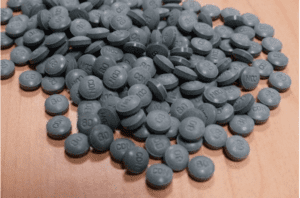Raid In British Columbia, Canada Turns Up A Pill Press And Over 100 Different Pill Dyes

Seized counterfeit pills
Source: Royal Canadian Mounted Police
The Vancouver Sun reported that the Surrey Royal Canadian Mounted Police (RCMP) in British Columbia announced the raid of two storage units that led to the seizure of large quantities of illegal drugs, plus equipment and chemicals necessary to manufacture counterfeit pills. During the November 29, 2018 raid, the police seized dyes for more than 100 different types of pills along with 20 kilograms of a pill binding agent and other chemicals and instructive books on how to manufacture illegal drugs.
Police tested the seized equipment and found it tested positive for fentanyl. In a statement released the Surrey RCMP, community services officer Shawn Gill said, “Over the past few years we have seen the effects of illicit drugs in our community. Not only has it led to tragic overdose deaths, but the illegal drug trade has also contributed to violent disputes involving gang members and associates. By making this seizure, we are reducing the potential for harm among our vulnerable people in the community and impacting the individuals who put the public at risk with their actions.”
No charges have been filed at this time as the investigation is ongoing. In the nearby town of Delta, less than thirty minutes from Surrey, parents received a warning after officials confiscated Xanax pills that tested positive for fentanyl brought into a high school by a student. According to the Surrey Now-Leader, the email did not say where the student sourced the illicit pills, but Jen Hill, the communications manager for the Delta School District, said of the situation: “This is extremely concerning information, and as such, we felt it is essential to share this with our parents and extended community.”
However, it is not just this school in the western part of Canada that is having issues with students and counterfeit pills. Canadian Broadcasting Corporation (CBC) reported that a high school in eastern Ontario issued their warning after students experienced “bad reactions or overdoses” from what officials believe was a bad batch of counterfeit Xanax. The issue began at this school around the second Monday in October, and officials are still working to determine what the pills contain. Dr. Kieran Moore, the area’s medical officer of health, said the pills could contain fentanyl because doctors do not normally see this number of adverse reactions to Xanax itself. In an interview with CBC Radio’s Ontario Morning, Dr. Moore warned the public, “If you’re getting any drug off the street, you should assume it’s laced.”
Counterfeit drugs are a global issue, and Canada is no exception. According to the RCMP, Canadian officials inspected 3,586 packages during INTERPOL’s week-long Operation Pangea in 2018 and seized 87% of them because they contained counterfeit or unlicensed health products, such as illegal prescription drugs. RCMP Deputy Commissioner Gilles Michaud commented on the success of the operation: “Every year, Operation Pangea is an opportunity to inform the public about the risks and dangers of purchasing medicines online. By partnering with INTERPOL, CBSA (Canada Border Services Agency) and Health Canada, we hope to stop the selling of illicit medicines by reducing the supply and demand of counterfeit pharmaceuticals through education and awareness.”